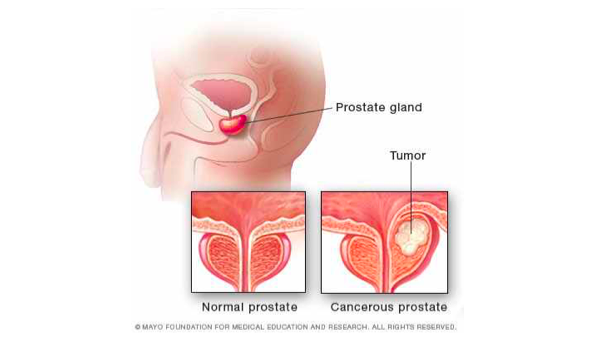-
Cancer
5 things to know about prostate cancer during Men’s Health Week

Get smart during Men's Health Week by learning about the latest prostate cancer news, including how a new test offered through Mayo Clinic is reducing unnecessary biopsies.
Here are five things to know:
1. One in 7 men will be diagnosed with prostate cancer during his lifetime, according to the American Cancer Society.
"Prostate cancer is a very common tumor within the prostate," says Dr. Matthew Tollefson, a urologic oncologist at Mayo Clinic. "It is largely a disease that happens in men as they get older, in their 50s, 60s and 70s."
Watch: Dr. Tollefson explains prostate cancer.
Journalists: Broadcast quality sound bites with Dr. Tollefson are in the downloads.
2. Some men are at a higher risk for prostate cancer.
"If someone in your family has been diagnosed with prostate cancer, it’s important for you to get screened and tested," says Dr.Tollefson. "And African-American men are at increased risk for developing a more aggressive type of prostate cancer."
Dr. Tollefson says the risk for all men increases with age.
3. Early detection is best.
Prostate cancer detected when it's still confined to the prostate gland has a better chance of being treated successfully. While some types of prostate cancer grow slowly and may need minimal or no treatment, other types are aggressive and can spread quickly.

4. The U.S. Preventive Services Task Force has modified its screening recommendations for prostate cancer.
The task force encourages men 55 to 69 to balance the benefits and risks involved, and work with their health care provider to make an individualized decision about screening. The task force continues to recommend against screening men 70 and older.
Watch: Dr. Tollefson explains the new recommendations.
Journalists: Broadcast quality sound bites with Dr. Tollefson are in the downloads.
5. Mayo Clinic offers a new test to better detect prostate cancer.
The Prostate Health Index, or PHI test, fills the diagnostic gap between a prostate blood screening and prostate biopsy.
“By performing the Prostate Health Index test, we’re able to provide a better risk assessment of that patient’s likelihood of having a malignancy upon biopsy,” says Dr. Alicia Algeciras-Schimnich, chair of Mayo Clinic's Division of Clinical Biochemistry.
The test, offered in collaboration with the company Beckman Coulter, combines three blood assessments to calculate a Prostate Health Index score that is tailored to each patient. This test has been found to reduce unnecessary biopsies by 30 percent.
Watch: Dr. Algeciras-Schimnich explains the Prostate Health Index test.







